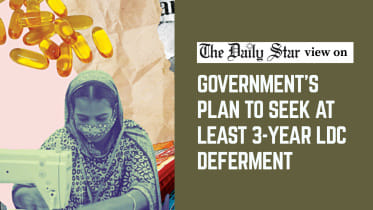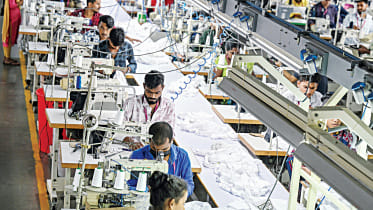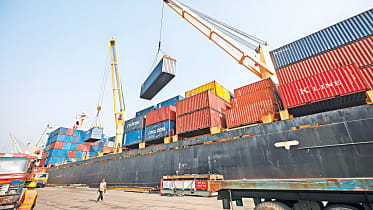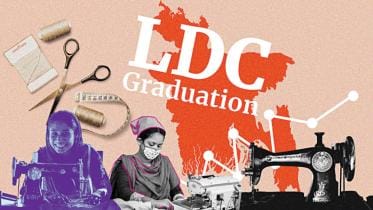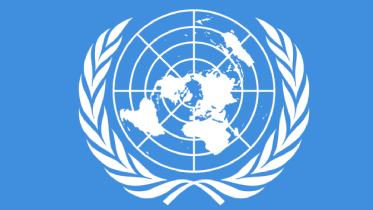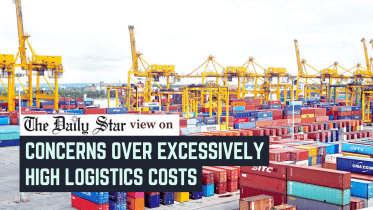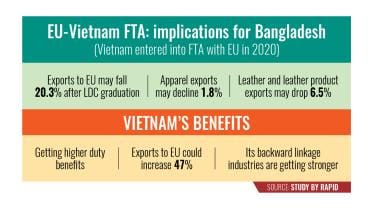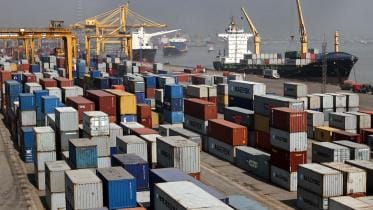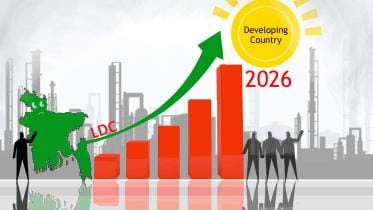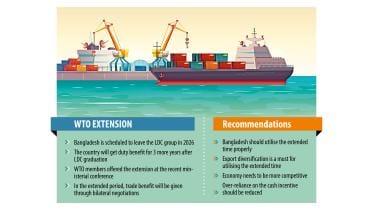Bangladesh LDC graduation
How logical is LDC graduation deferment?
Dialogue at home and abroad will determine that
19 February 2026, 00:42 AM
UK’s trade preference shift offers Bangladesh rare post-LDC relief
Amid Bangladesh’s fragmented preparation for LDC graduation, and at a time when unpredictable global geopolitical dynamics are reshaping competitiveness, some quietly consequential and rather rare good news has emerged from the United Kingdom.
8 February 2026, 00:37 AM
The EU-India trade deal: What implications for Bangladesh
The deal that changes the competitive landscape
29 January 2026, 11:46 AM
EU-India trade deal: Bangladeshi exporters to face tougher days
The European Union and India reached a sweeping free trade deal granting Indian clothing manufacturers duty-free access to the bloc.
29 January 2026, 04:15 AM
LDC graduation will expose economy to serious risks
Bangladesh is not fully prepared to face the economic and institutional challenges that will follow its graduation from the least developed country (LDC) category later this year, business leaders and bankers said yesterday, warning that it could expose the economy to serious risks.
28 January 2026, 00:00 AM
Will delaying LDC graduation address problems long ignored?
Bangladesh is on the path to graduate from Least Developed Country (LDC) status on 24 November 2026. In 2018, and again in 2021, the country crossed all the required thresholds set by the United Nations,
24 January 2026, 19:57 PM
UN panel queries Bangladesh’s economic readiness for LDC exit
The panel inquired about Bangladesh's readiness for graduation
26 November 2025, 18:00 PM
UN CDP reviews Bangladesh’s economic readiness ahead of LDC graduation
Bangladesh is scheduled to graduate from LDC status in November 2026
26 November 2025, 02:46 AM
Justification, plan needed to defer LDC graduation
The government has not submitted any proposal for the deferral as of now
12 November 2025, 18:00 PM
Private sector seeks six-year delay to LDC graduation
Business leaders tell UN delegation that past growth figures were inflated
10 November 2025, 18:00 PM
UN asks Bangladesh about LDC graduation progress
The United Nations Committee for Development Policy (UN CDP), which reviews the least developed country (LDC) category, has invited Bangladesh to report on the progress of its preparation for graduation from LDC.
17 September 2025, 18:00 PM
Bangladesh's decision on LDC graduation deferral needs careful assessment
Short-term image building rather than long-term readiness drove the eagerness to graduate.
19 August 2025, 02:00 AM
The end of exemption?
TRIPS waiver end poses dual challenge: legal and technological
1 August 2025, 18:00 PM
Bangladesh's logistics sector needs an overhaul
Its high costs are hindering progress
1 July 2025, 07:00 AM
Post-LDC challenges and the future of Bangladesh's exports
The path ahead is becoming clearer, and more complicated.
17 April 2025, 03:00 AM
Exports to EU may fall 20%
Bangladesh’s overall exports to the European Union (EU) may fall by as much as 20 percent due to the combined impacts of the nation’s graduation from least developed country (LDC) status and the EU-Vietnam Free Trade Agreement (EVFTA), according to a study.
27 November 2024, 18:00 PM
Bangladesh cuts cash incentive for exporters further
From FY25 beginning today, the maximum rate of export incentive has been set at 10% and the minimum at 0.3%
1 July 2024, 06:01 AM
Changing trade policy directions is imperative now
The forthcoming FY2024-25 national budget must show that we mean business.
5 June 2024, 03:00 AM
Why is WTO’s 13th Ministerial Conference important for Bangladesh?
It is especially important now as Bangladesh is set to graduate from its LDC status and become a developing country by 2026.
12 March 2024, 01:00 AM
Make most of LDC-linked duty benefits during extended period
Bangladesh should make the most of the LDC-linked trade benefits during the extended three-year period agreed by the member countries of the World Trade Organisation (WTO), said experts yesterday.
12 March 2024, 00:59 AM



